Amanda Ngabirano: the Ugandan who inspired Swedish filmmakers
She is a passionate advocate of the use of the bicycle as a mode of transport.
A Ugandan female lecturer is featuring in a short film by Swedish directors for relentlessly encouraging the need for planning for and riding bicycles as a mode of transport.
Amanda Ngabirano is a married mother of two, an urban planner and a lecturer at Makerere University.
The film ‘Cycologic' will premiere at the Malmo Film Festival in the Swedish city of Malmo on August 17.
Ngabirano is a passionate advocate of the use of the bicycle as a mode of transport, especially in Uganda's capital Kampala, where heavy traffic jam is the order of the day.
Even with the absence of bicycle lanes in Kampala, the 37-year-old has been seen riding her bicycle on some streets.
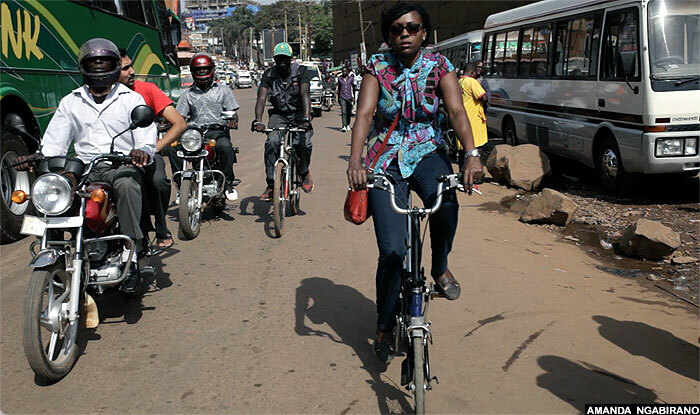
Ngabirano looks very much at ease as she snakes through the busy Kampala streets
Directors Emilia Stålhammar, Elsa Löwdinand Veronica Pålssonare shot the film as part of their study project. They said they wanted to show some positive aspects of Uganda and Africa, away from the stereotypical mostly negative attention.
They discovered Ngabirano and her contribution to cycling from her various local and international presentations as published online as well as her sustained social media campaign, and so they ended up traveling to Uganda to meet her and eventually getting to realize how much of a "great force" she was.
" Due to presidential election campaign tension and my domestic engagements, they were unable to carry out their activities as planned and returned to Sweden very disappointed but a month later, they were back in Uganda and were able to get hold of me who features as the lead character of their film," says Ngabirano.
For the last six years, the Ugandan enthusiast has been calling on government to develop a culture of active modes of transport, that is, mainly walking and bicycle riding by providing safe and conducive infrastructure.
She says their benefits are immense and it's always a win-win situation from all angles.
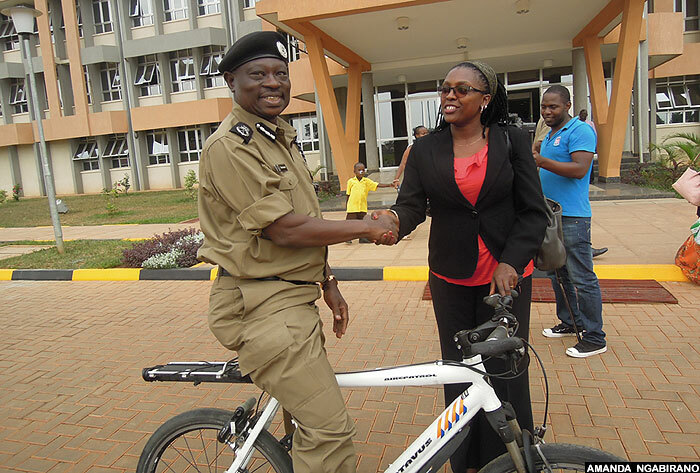
Ngabirano is seen here shaking hands with Police's Andrew Sorowen as she handed over patrol bicycles donated by the Dutch Police to their Ugandan counterparts. The Dutch Police also patrol by bikes
Ngabirano told New Vision that cycling is a hot global topic and Uganda should not lag behind for any reason. "With a bicycle, getting around places can be very fast and convenient yet pleasurable, at almost no cost."
She has addressed several conferences in Canada, Austria, Netherlands, France, Kenya, South Africa and Taiwan about bicycle transport.
She has also engaged the Ugandan government, both at national and local levels and recently enlightened the ministry of works and transport on how bicycle transport strongly delivers on the Sustainable Development Goals (SDGs).
"Using bicycles is economical compared to using cars and motorcycles; it is also environment-friendly. Bicycles are very space-efficient in terms of road space and parking facilities. For short distances, they are an excellent mode. No mode complements public transport more than bicycle transport. It is great for tourism too. It is said to be the most silent, healthy and social means of mobility in urban areas" says Ngabirano.
"Riding bicycles promotes social justice and equity since the other members of society considered poor have access to safe cycling facilities," she adds. "It also promotes social cohesion since both the poor and rich can all ride on the same lanes, and the bicycle is just a bicycle."
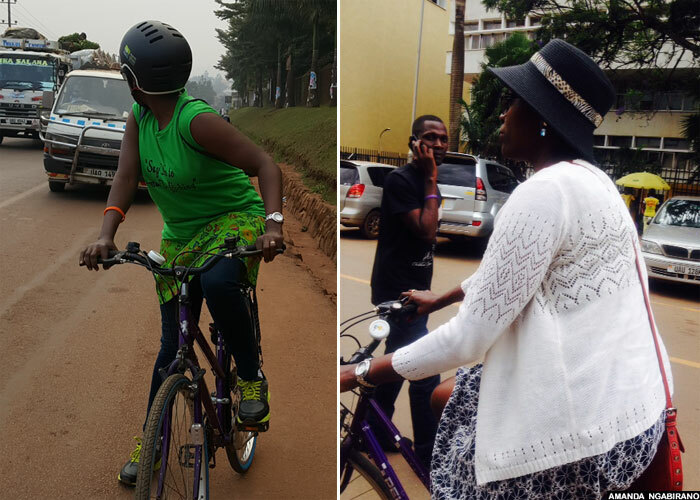
Along the way, she has realized what negative mindset our society still has on bicycle transport, and the message she is trying put across is that bicycle transport is not for the poor.
"It is just that it is not provided for, hence the poor seem pushed to use it despite its being very safe. If it was for the poor, why would the Dutch Prime Minister Mark Rutte ride to work?"
The Guardian of February 29 2016 reported that the city of Milan (Italy) was seeking to reimburse those who ride to work because of its benefits. Ngabirano says that car ownership does not necessarily mean car use for all trips because of a number of its related negative consequences.
From a gender perspective, the Makerere University lecturer says that gone are the days when riding a bicycle was considered a ‘male thing'. Women and girls can ride too; but to have them ride in urban areas, safe infrastructure is a must.
"Seeing a woman riding a bicycle should not be seen as a sign of courage and fearlessness but rather a sign of safe streets; and that should be the focus of the planning authorities. And the story that girls should never ride for fear of losing their virginity is nothing but a myth."
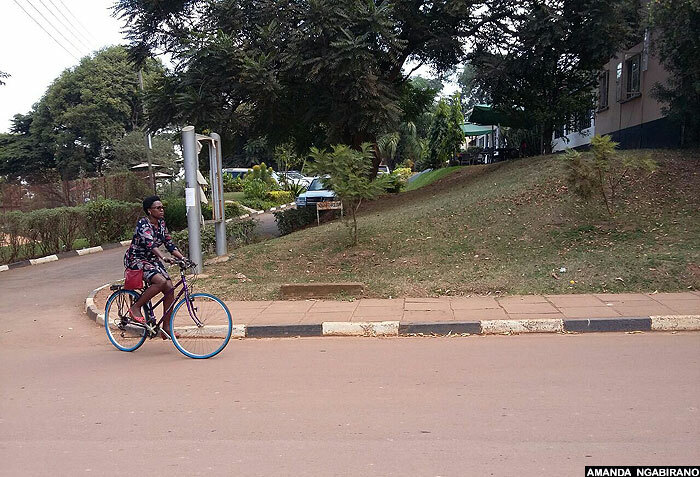
Here, Ngabirano rides within the environs of Makerere University, where she is a lecturer. She maintains that attitudes towards bicycle-riding should change
So how and when did she get hooked to this unbeatable passion?
Ngabirano says it all started in 2009 - when she realized how expensive and inconvenient it was to get around as a student in The Netherlands. She then decided to buy a second-hand bicycle, and was helped by a Tanzanian classmate to learn how to ride.
In just eight months, she was able to save about sh3.7m from transport costs. Today, she owns four bicycles and says an average good second-hand bicycle in Uganda costs about sh600,000.
According to Ngabirano, the bicycle industry is so profitable and good for growth. Investing in cycling increases the number of cycling-related jobs; more cycling creates new types of jobs but public authorities have to take the lead. "Common reasons for not investing in it are just scapegoats. Not even terrain and weather should be an excuse if a proper network design and related facilities are in place."
Her main message to the Ugandan and other African governments is to ensure that all road users are given equal opportunity to move safely no matter their social status, age, physical state and gender; and this should be adhered to right from the decision-making stage to the actual road space design and use.
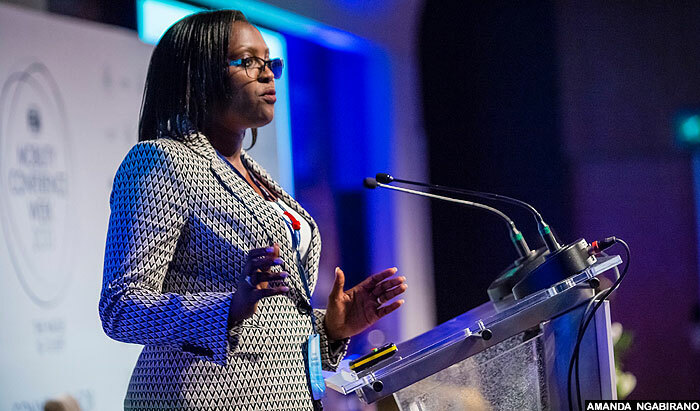
Ngabirano is a well-travelled person, and her interest and passion for bicycle use has seen her make presentations in a number of countries
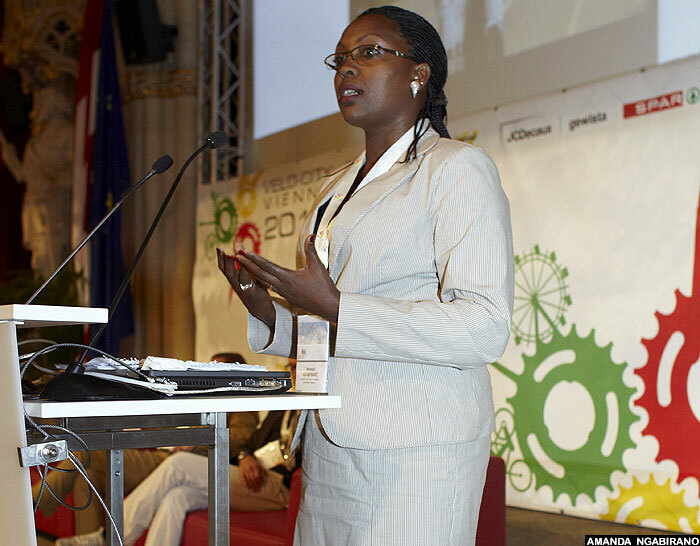
Here in Vienna, Austria in June 2013 . . .
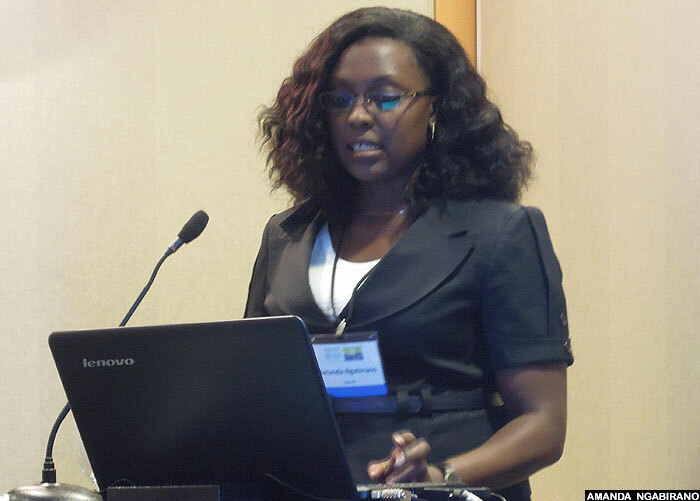
. . . and the year before at the Velo-city Global 2012 in Vancouver, Canada
Here's how she summarizes her dream for Africa in relation to her passion:
"I am dreaming of my Africa with safe cycling infrastructure for her future: where all can freely choose to ride somewhere, when they want, where our children will stop riding in our houses and compounds, but get on streets and remain safe from traffic cruelty; streets where children, women and the elderly will smile as they move, streets with better air quality, streets where men will safely pause and admire their healthy, happy and free families as they move, and be proud of where they belong and live; I am forever dreaming of free streets, free neighborhoods, happy and united people. And to be honest, I am dreaming of leaders who have this same dream."
Ngabirano holds a Master of Science degree in Urban & Regional Planning & Development from the University of Greenwich. She also holds a bachelor's degree in urban and regional planning from Makerere University. She is currently the African representative on the World Cycling Alliance board.
Eng Andrew Kitaka, the director of Engineering and Technical Services at Kampala Capital City Authority (KCCA), said planning had been biased towards motorized transport for too long.
"We want to change this because most people are into walking and cycling but not cars," he said recently during a conference.
And on their part, the film directors say the objectives of shooting the film is to promote gender, women emancipation and social justice and equity especially for the African people. "Amanda is seen to be a ‘commander' championing the great campaign," says Emilia Stålhammar.